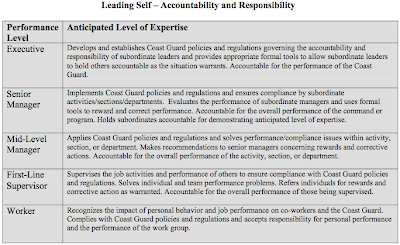Today is the first Wednesday in the April “Spotlight on Leadership Campaign” during which we will investigate a different aspect of leadership each week. Today’s is “Accountability and Responsibility,” aptly the first as I tend to regard personal accountability and responsibility as the foundation upon which all other success is built. I have found it to be the single most important value both at work and in my life outside of work. Sometimes things don’t work out, sometimes you don’t please everyone, sometimes you do something wrong, but it is only when you take ownership of your successes and your shortcomings that you can move forward — capable of taking on the next challenge — with self-respect and the respect of (most of) those around you.
Consider: What does accountability and responsibility mean to you, in your life, in your work? How have you made this aspect of leadership (and followership) work for you and those around you?
This was not always the case, in my life at least. I vividly remember times long past, before I made personal accountability and responsibility a near-sacred priority, when modus operandi was about coming up with reasons why things that didn’t go well were the fault of any person (or any thing) but myself. Nobody likes to be at fault, but if you hold yourself accountable in cases where the fault is yours, you create an opportunity to learn from those experiences, earn the respect and trust of others, and can then take positive responsibility for the (increasingly frequent, I suggest) great things that you find yourself associated with.
The Spotlight on Leadership Campaign is a U.S. Coast Guard effort, whose themes I am applying more broadly to the context of leadership in any organization — corporate or military, government or non-governmental, paid or volunteer. The USCG Leadership Development Framework speaks of accountability and responsibility in the statement below (which I have slightly modified to make more broadly applicable in a number of different organizations).
Leaders know their service and organization, recognizing the organizational structure and the chain of command. Each individual is sensitive to the impact of his or her behavior on others and the organization. Leaders take ownership for their areas of responsibility, are accountable to effectively organize and prioritize tasks, and efficiently use resources. Regulations and guidelines that govern accountability and responsibility allow leaders to use appropriate formal tools to hold others accountable when situations warrant.
The framework goes on discuss what one might expect of themselves, depending on the level in the organization that you work. See below, and note that you may have to click the image to enlarge to something readable.

As you ponder this, I ask again: What does accountability and responsibility mean to you, in your life, in your work? How have you made this aspect of leadership (and followership) work for you and those around you?
I am eager for your thoughts!




Leave a Reply
You must be logged in to post a comment.